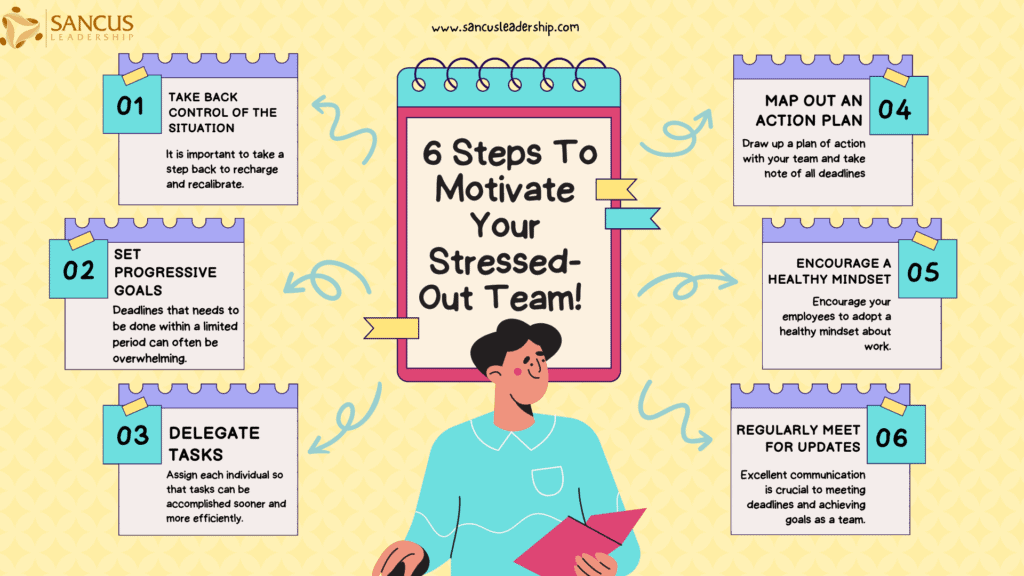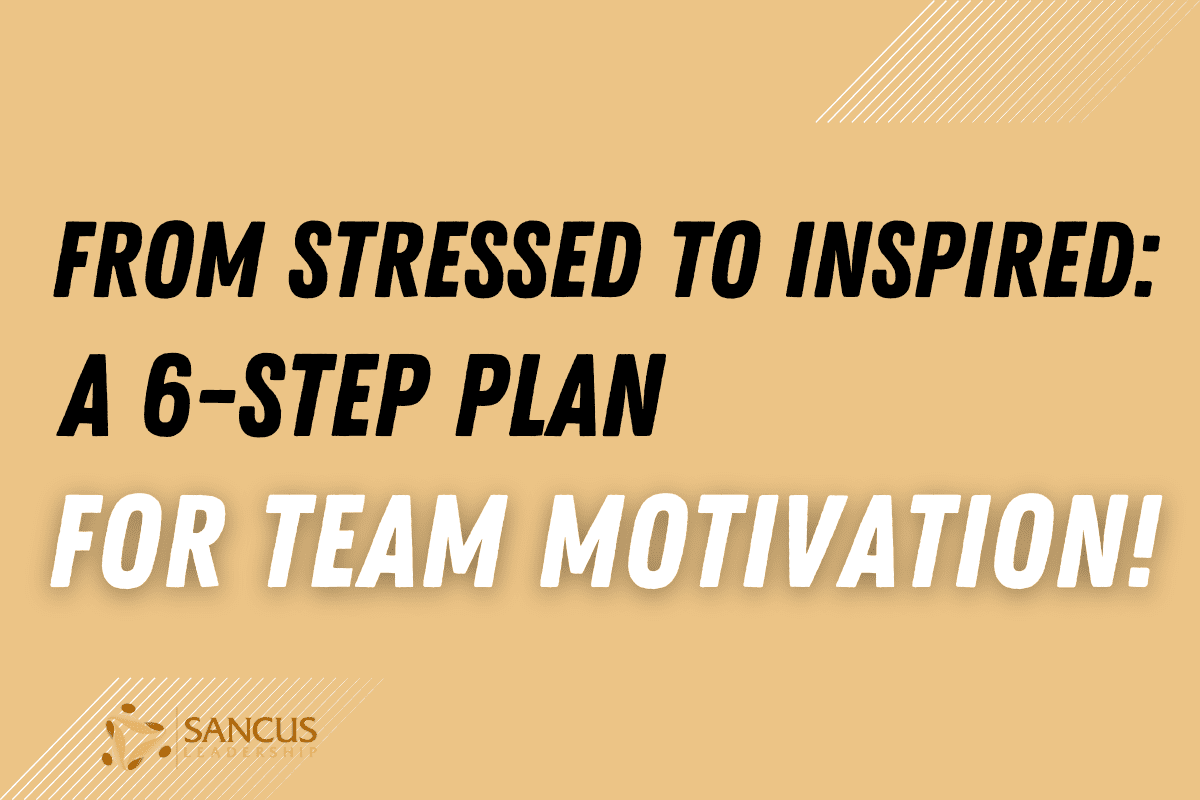While preparing for my first international deployment with the army, my team and I went through an extraordinarily stressful time with strict deadlines. I even had soldiers come up to me crying, saying they couldn’t take the pressure anymore. The motivation was at its all-time low, but the problem with military operations is that the enemy doesn’t care. I had to step up and show them this would all be worth it. This was one of the times my leadership was forged, as we call it here at Sancus Leadership.
Motivating your team under tight deadlines and stress includes:
- Taking back control of the situation.
- Removing all non-vital tasks.
- Focusing on short-term wins.
- Communicating why the suffering is worth it.
In this article, I’ll discuss how you can keep your team’s spirits up during tight deadlines and high-stress levels. I’ll also explain the power of recalibrating and ensuring that everyone is on the same page, followed by the value of breaking down tasks into smaller portions so they no longer seem daunting. Additionally, I’ll share some tips on perceiving deadlines as motivators rather than stressors.
1. Take Back Control of the Situation

Whenever you feel overwhelmed with tight deadlines and stress and feel like you can no longer think straight, it is important to take a step back to recharge and recalibrate.
When I find myself in a stressful situation, whether it be a car crash on my way home or at work, I follow the S.T.O.P standard operating procedure,
1. Stop
I mean this literally, sit down and breathe slowly for 10 to 15 seconds, preferably with a box or tactical breathing method. This will instantly reduce your stress level, free up some computing power and allow you to make intelligent decisions that will benefit your team.
This is where you can make or break team spirit; if the team sees you are losing control of the situation, they are bound to look elsewhere for guidance.
2. Think
With your body and mind less stressed, observe the situation. What are the threats to your team and the mission? What do you have to do immediately to stop chaos from continuing?
There is almost always time to consult your team members; only in very few highly intense situations should you make decisions on your own, and these situations rarely exist in business.
Get your team involved and allow them to understand that they are a part of the solution. Please encourage them to take extreme ownership of their roles and assignments.
3. Orient Yourself
Now that you have a better idea of the threats and possibilities, it is time to focus your energy on solving the highest priorities first. Orient yourself and your point toward that which would give the most significant benefits the fastest.
Cut away anything that doesn’t leave directly to the goal. There is a better time to make things perfect, your team is having a tough time, and you should respect that by only doing the necessities and not overwhelming them.
4. Plan
At this stage, you should have a somewhat clear idea of what is stopping your team and what you need to get done to get your guys back up the ladder of motivation and continue towards the goals.
It is time to start figuring out the long-term plan; how do we solve the problems that got us into this mess, and how do we do it in a way that also encourages growth is growth in the long term?
These four steps are a practical outcome of the self-management theory, a skill vital to good leadership.
Leading and managing your team means knowing when to keep pushing and when to stop. It can be very destructive to keep pressing your team members closer to your goals beyond what they can handle.
Leading and managing your team means knowing when to keep pushing and when to stop.
Sometimes, your team will be much better off with a short break so everyone can relax, find their bearings, and devise a road map to get things done more efficiently.
| S.T.O.P. Procedure | Description |
| Stop | Take a break and breathe slowly for 10-15 seconds to reduce stress levels and make better decisions. |
| Think | Observe the situation and identify threats to the team and mission. Consult with team members to involve them in finding a solution. |
| Orient Yourself | Focus on solving the highest priorities first, cutting away anything that does not directly lead to the goal. |
| Plan | Figure out a long-term plan to solve the problems and encourage growth. Know when to stop pushing your team and when to take a break. |
How Do You Motivate Your Team in Stressful Situations?
You can motivate your team in stressful situations by showing them why the suffering will be worth it, that you have their back, and how valuable their role on the team is. Help them further by canceling all non-vital tasks and letting them focus on the essentials and conserve energy.
Keeping your team’s spirits up during difficult times is essential to maintain efficiency and productivity. We rarely find ourselves motivated to compete for a task when we are exhausted, so encouraging your team to take care of themselves inside and outside of the job is important.
Here are some tips on motivating your team in stressful situations.
Collaborate With Your Team
One way to ignite team spirit is by allowing your team to brainstorm on tackling stressful situations. Please encourage them to unleash their creativity and suggest ways to better deal with factors such as deadlines, demanding clients, or delayed deliverables.
Listen to their story to uncover any negative feedback or complaints. Please encourage them to give suggestions on how to improve the situation or execute things more efficiently. If you listen to your employees and make them realize that their input is important to you, they will be inspired to always aim for excellence.
Be Open With Your Team
Always be clear and straightforward about the expectations and goals you’ve set for the team. Doing so is a great way to let them in on what the next few months will be like so they know what to expect and what their roles will be in ensuring that these targets will be met.
Maintaining open communication lines with your team ensures they stay engaged despite difficulties and stress. It helps them stay aligned with the organization even when obstacles stand in their way.
It is important that you connect with your team so you understand what they need, not only what you think they need because you read something on a blog post.😉
Be Generous With Praise
Make it a point to recognize your team members for good results and excellent effort. There are different ways to do so, but determine how best to show your appreciation to your team.
Consider launching a rewards program to show you value your team members’ efforts and achievements. You can draw up incentive schemes where your team can collect points to exchange for cash, gift checks, household appliances, or food items. You can also treat your entire team to a fun and relaxation-filled night after reaching milestones.
Ensure you understand the differences between intrinsic and extrinsic motivators and how they will impact your team. Many team leaders I meet need to correct this.
Emphasize the Value of Self-Care
Highly stressful circumstances often make people have tunnel vision in matters pertaining only to work and tasks at hand. If your team members are frequently stressed about tight deadlines, they might already neglect self-care, negatively affecting how they execute their job.
Emphasize the importance of caring for oneself despite challenges and difficulties. People who feel good about themselves generally perform better and can deliver quality results.
Here are some pointers to give your team members during particularly stressful days at work:
- Stay healthy. Eating healthy when you are stressed is essential, and the demands on your body are higher. A higher calorie intake during a stressful time can be good for you.
- Stay hydrated—drink water. Make it simple!
- Prioritize exercise. You have the time to go work out! I don’t mean a short walk; I mean getting sweaty and tired. The benefits you already know.
| Tips for motivating your team in stressful situations | Description |
| Collaborate with your team | Allow them to brainstorm and suggest ways to tackle stressful situations. Listen to their feedback and encourage suggestions for improvements. |
| Be open with your team | Clearly communicate expectations and goals for the team to ensure they know what to expect and what their role is in achieving targets. Maintain open communication to keep them engaged and aligned with the organization. |
| Be generous with praise | Recognize team members for their good work and effort. Consider launching a rewards program to show you value their contributions. |
| Emphasize the value of self-care | Encourage your team to take care of themselves both inside and outside of work. People who feel good about themselves tend to perform better and deliver quality results. |
2. Set Progressive Goals

Deadlines and the amount of work that needs to be done within a limited period can often be overwhelming. Sometimes, team members might feel frustrated or intimidated, causing them to feel disengaged from the tasks at hand. This mindset may result in low productivity and poor-quality output.
Consider breaking up larger goals into smaller, more manageable objectives so that employees will experience a sense of achievement every time they reach a milestone.
Consider breaking up larger goals into smaller, more manageable objectives so that employees will experience a sense of achievement every time they reach a milestone.
Your team members will eventually notice that they’re steadily gaining traction and moving continuously closer to the primary goal. Effectively leading and managing your team means you must be capable of guiding them through the most efficient paths leading to success.
Here are some tips on how to do it:
- Sort your tasks. Prioritize tasks based on importance and urgency. Usually, urgent tasks mean you have less time to accomplish them. In contrast, important tasks have a more significant impact on the organization but only need to be completed after some time.
- Consider the level of difficulty. Complex tasks require more time and effort. You should hold off on these tasks to ensure that the urgent and important ones are carried out on time.
- Group similar tasks together. Grouping related tasks allow you to focus better and develop a rhythm as you go along, which helps you accomplish tasks faster and with seemingly less effort.
Some people also find it motivating to set “fake” deadlines for themselves. They set a personal deadline considerably earlier than the official deadline, so they have enough time to review their work, make corrections, or improve it. Consider suggesting this idea to your team members to reduce the burden for those who find deadlines quite nerve-racking.
3. Delegate Tasks

Now that you’ve set progressive goals within your team, it’s time to initiate the assault and win the fight. Delegate tasks to your team members while considering each of their strengths. Assign each individual to areas where they are most proficient so that tasks can be accomplished sooner and more efficiently.
Assigning relevant tasks to your team members is a great way to boost their morale and give them a chance to showcase their expertise and sharpen their skills.
However, make it a point to get feedback from your team members on the task delegation process. Some employees are eager to explore and try new areas, but this should probably be done after a stressful period rather than during one.
Consider providing additional support in developing your employees by providing training programs suited to their needs. Someone well-trained is likely to stay calm and motivated.
A crash course on your organization’s profile, clientele, and expertise would be helpful for newer team members. For more tenured employees, honing their skills in various aspects, such as selling, marketing, or administrative tasks, will help improve their work quality.
By giving importance to your team’s development, you show them you value their presence and contributions to the company. A boost in their self-confidence will significantly impact how they perceive their job. They will be inspired to enhance their talents and skills further and always deliver quality work.
By giving importance to your team’s development, you show them you value their presence and contributions to the company.
4. Map Out an Action Plan

Draw up a plan of action with your team and take note of all deadlines. It would help to visually represent your plan and distribute copies to all team members. This tactic allows complete transparency and accountability for all tasks and deadlines. Making the project readily available to everyone at any given time will also help keep the team aware of their roles and unique contributions to the group.
It is hard to motivate someone with something they don’t believe will work. We are much more likely to accept and engage with the idea we have created ourselves. This is why it is so important for you to involve your team in the planning process.
5. Encourage a Healthy Mindset

Leading and managing your team means you also have to think about how you can encourage your employees to adopt a healthy mindset about work. Often, looming deadlines are seen as highly stressful occurrences.
Most people who tend to procrastinate typically find themselves pulling all-nighters to meet deadlines. Thus, they easily cringe at the mere idea of delivering quality results within a set timeline.
One way to significantly curb work-related stress is to encourage your team to think of deadlines as motivators rather than stressors. Here are some vital elements about deadlines that your team members may not have come to realize yet:
- They’re great yardsticks. Tracking where you are in terms of getting to the finish line — the deadline — can be quite rewarding and fulfilling. With each deadline you meet, you get closer to your goals.
- They allow you to manage your time wisely. Deadlines provide you with a clear and specific direction. Knowing you must work on a particular task within a limited period teaches you to prioritize and focus on what’s critically important.
- They help develop better work habits. Being regularly faced with tight deadlines trains you to be mindful of how you spend your time at work. Resisting distractions can sometimes be challenging, but if you have deadlines looming ahead, you’ll stick to the plan rather than stray.
6. Regularly Meet for Updates

Excellent communication is crucial to meeting deadlines and achieving goals as a team. Meet with your team members regularly to update each other on how much progress has been made. It’s also an excellent chance to share insights, tips, and relevant advice on accomplishing tasks.
Remind your team that each member is connected, especially regarding task accomplishment. Each member has a significant role in ensuring the organization’s goals are met (Otherwise, you would have them on the team, right?).
These regular meetings will help enlighten team members on how close they’re getting to accomplishing the expected tasks and how they fare about their peers.
Leading and managing a team means you must understand and develop your employees’ talents and skills so they can perform at a high level for a long time.

Bonus Tip!
A big part of leadership is giving your team a sense that you “Have your shit together!”
If all they see is a disorganized manager always asking to borrow a pen, it’s much harder for them to trust decisions and put in the effort.
A skill that should be remembered, especially with us more creatively oriented leaders, is organizational skills. Reducing chaos and clutter — in your mind and work environment — can significantly help boost productivity and reduce stress.
Here are some tips on how to make your space more organized:
- Make a to-do list. Your list can be daily, weekly, or even monthly. What’s important is you have a clear idea of what needs to be done at the start of every workday. You start with the most critical tasks and do nothing else until they are down.
- Prepare ahead. Make a list of tools, resources, and any other information you need. This way, you can acquire these necessary things before you need them.
- Group things together. Constantly looking for items like pens, papers, or contact numbers wastes precious time. Gather them in a way that makes sense so you know exactly where to look when you need something.
Here’s a quick video of Simon Sinek giving tips on how to motivate your team members when they seem unmotivated and stressed.



